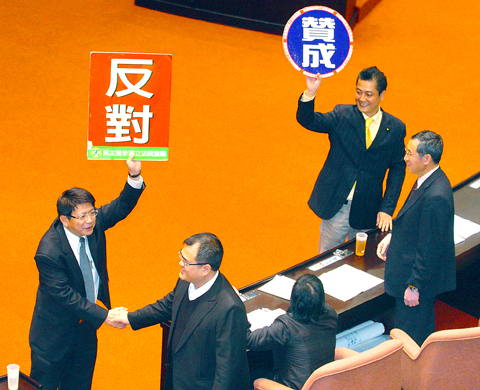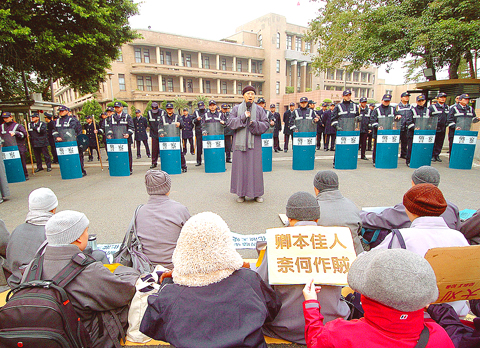Despite demonstrations outside the legislature, the Legislative Yuan yesterday approved an amendment to the Offshore Islands Development Act (離島建設條例), legalizing the operation of casinos on the nation’s outlying islands.
The 98 legislators present during the plenary session voted 72 to 26 in support of a proposed amendment by the Non-Partisan Solidarity Union (NPSU) that would allow the opening of casinos on islands like Kinmen, Matsu, Orchid Island and Green Island.
Gambling is illegal in Taiwan.

PHOTO: LIAO CHEN-HUEI, TAIPEI TIMES
The amendment stipulated that local governments must hold a referendum before building casinos.
The referendums would only need to win support from more than half of the voters participating in the referendum.
The bill stipulated that casinos be located within international resorts that include an international hotel, tourism facilities, international conference halls and shopping malls.

PHOTO: FANG PIN-CHAO, TAIPEI TIMES
Companies interested in building an international resort on any of the nation’s islands would need to apply to the Ministry of Transportation and Communications.
The legislature also approved another amendment to the act that would oblige the central government to set up a minimum fund of NT$30 billion (US$901 million) to improve the development of the islands.
After passage of the amendments, Chinese Nationalist Party (KMT) and NPSU legislators applauded the move, while Democratic Progressive Party legislators chanted: “Gambling cannot save the nation’s economy.”
NPSU Legislator Lin Pin-kun (林炳坤) told reporters that legalizing operation of casinos on the islands was necessary for the country to be “internationalized.”
KMT Legislator Wu Ching-chih (吳清池) said he cast an affirmative vote as a result of the caucus’ decision, but that he “was saddened” to see the bill pass.
DPP Spokesman Cheng Wen-tsang (鄭文燦) said the DPP regretted the passing of the bill and that the KMT should take responsibility for the consequences of opening casinos in the country.
Outside the legislature, a group of Buddhist monks and other activists demonstrated against the passage of the amendments.
“We are disappointed and upset about this result. Such a controversial issue should have been openly debated and decided by a nationwide referendum,” Buddhist master Shih Chao-hui (釋昭慧) told demonstrators. “Representatives for the Catholic and Protestant churches, as well as Buddhists in Taiwan, have stood up against casinos today. The KMT has apparently taken a hostile step against religious organizations in Taiwan.”
Aside from Shih, Archbishop of Taipei John Hung (洪山川) and a preacher from the Taiwan Presbyterian Church, Lu Chun-yi (盧俊義), also joined the protest. The protesters recited a sutra — usually recited at funerals to redeem the deceased from his or her sins — to wash away the sins that KMT lawmakers committed by passing the amendment, Shih said.
The religious groups were joined by other civic groups who wished to express their concern about the negative impact of casinos.
“The crime rate in Las Vegas went up 1.7 times after gambling was legalized,” Citizen Congress Watch executive director Ho Tsung-hsun (何宗勳) said. “Las Vegas is also the city with the highest suicide and divorce rates in the US.”
Green Party Taiwan Secretary-General Pan Han-shen (潘翰聲) said that casinos could become money-laundering centers. Hu Tzu-fei (胡姿妃), a junior at National Penghu University, said that building casinos was an appropriate development strategy for Penghu.
Penghu County is so far the most probable candidate for the country’s first casino resort.
“What benefits will casinos bring for Penghu residents?” Hu asked. “The water and electricity supply systems are incapable of supporting large-scale casino resorts."
“We don’t have a big enough airport, flights are often sold out, and the weather in Penghu is not all that good,” she said.
Instead, Hu said the islands should promote the tourism resources it already has, including its landscape, beaches and unique cultural sites.
She added that the windy climate and surrounding waters make Penghu an ideal place to for sailing.
“Why can’t we develop tourism without casinos?” she said.
Presidential Office Spokesman Wang Yu-chi (王郁琦) said yesterday that the establishment of casinos on outlying islands was one of President Ma Ying-jeou’s (馬英九) campaign promises.
Outlying islands have limited resources and face financial problems, Wang said.
Wang said that Ma’s support for the amendments was to back the removal of legal roadblocks, not an endorsement for casinos on Taiwan proper, at least not at the moment.
Whether outlying islands establish casinos is up to local governments to decide, Wang said.
Meanwhile, Cabinet Spokesman Su Jun-pin (蘇俊賓) said yesterday that the government would take into consideration the concerns of the opponents of the “casino clause” when it maps out plans to establish tourism zones with casinos in offshore islands in the future.
“The passage [of the casino clause] was merely a step to decriminalize gambling in outlying islands, which did not mean that the government is set to establish casino there,” Su said.
Su said that casinos on outlying islands would only be established alongside appropriate supportive measures to make sure the development did not disrupt public security, damage the interests of local residents as well as to local ecology and environment.
Penghu County Commissioner Wang Chien-fa (王乾發) said yesterday that the county was scheduled to hold a referendum in either April or May. Until then, the county government would inform and communicate with Penghu residents about any development ideas
Wang said the amendment only decriminalized gaming, meaning that gambling would not face criminal charges from legal authorities. However, the government must still stipulate rules to regulate casino owners.
The government must also ensure that bids for operational licenses are conducted in a transparent manner. All this preparatory work will take at least a year to finish, he said.
The passage of the amendment was seen as encouraging for international investors like Amazing Holdings, which has been working on the development for about eight years.
Company executive Michael Treanor said yesterday that the company was pleased the bill was finally passed.
Treanor said that his company’s development plan had passed an environmental impact review and secured construction permits for a five-star resort hotel. The amendment came at a good time, he said.
The global economic downturn notwithstanding, Treanor said that the gambling industry was “recession-resistant” and that market studies showed their projects were still viable. The company was confident it would be able to win the support of Penghu residents, Treanor said.
Meanwhile, Citizen Congress Watch executive director Ho Tsung-hsun (何宗勳) urged the Cabinet to ask the legislature reconsider the amendment, saying that if not the organization would stage a large parade before May 20 in protest against the bill.
ADDITIONAL REPORTING BY SHIH HSIU-CHUAN, KO SHU-LING, RICH CHANG AND CNA

US President Donald Trump yesterday announced sweeping "reciprocal tariffs" on US trading partners, including a 32 percent tax on goods from Taiwan that is set to take effect on Wednesday. At a Rose Garden event, Trump declared a 10 percent baseline tax on imports from all countries, with the White House saying it would take effect on Saturday. Countries with larger trade surpluses with the US would face higher duties beginning on Wednesday, including Taiwan (32 percent), China (34 percent), Japan (24 percent), South Korea (25 percent), Vietnam (46 percent) and Thailand (36 percent). Canada and Mexico, the two largest US trading

China's military today said it began joint army, navy and rocket force exercises around Taiwan to "serve as a stern warning and powerful deterrent against Taiwanese independence," calling President William Lai (賴清德) a "parasite." The exercises come after Lai called Beijing a "foreign hostile force" last month. More than 10 Chinese military ships approached close to Taiwan's 24 nautical mile (44.4km) contiguous zone this morning and Taiwan sent its own warships to respond, two senior Taiwanese officials said. Taiwan has not yet detected any live fire by the Chinese military so far, one of the officials said. The drills took place after US Secretary

CHIP EXCEPTION: An official said that an exception for Taiwanese semiconductors would have a limited effect, as most are packaged in third nations before being sold The Executive Yuan yesterday decried US President Donald Trump’s 32 percent tariff on Taiwanese goods announced hours earlier as “unfair,” saying it would lodge a representation with Washington. The Cabinet in a statement described the pledged US tariffs, expected to take effect on Wednesday next week, as “deeply unreasonable” and “highly regrettable.” Cabinet spokeswoman Michelle Lee (李慧芝) said that the government would “lodge a solemn representation” with the US Trade Representative and continue negotiating with Washington to “ensure the interests of our nation and industries.” Trump at a news conference in Washington on Wednesday announced a 10 percent baseline tariff on most goods

THUGGISH BEHAVIOR: Encouraging people to report independence supporters is another intimidation tactic that threatens cross-strait peace, the state department said China setting up an online system for reporting “Taiwanese independence” advocates is an “irresponsible and reprehensible” act, a US government spokesperson said on Friday. “China’s call for private individuals to report on alleged ‘persecution or suppression’ by supposed ‘Taiwan independence henchmen and accomplices’ is irresponsible and reprehensible,” an unnamed US Department of State spokesperson told the Central News Agency in an e-mail. The move is part of Beijing’s “intimidation campaign” against Taiwan and its supporters, and is “threatening free speech around the world, destabilizing the Indo-Pacific region, and deliberately eroding the cross-strait status quo,” the spokesperson said. The Chinese Communist Party’s “threats